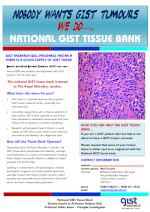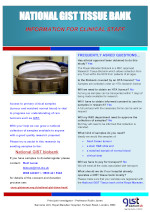
Living with PAWS-GIST
The PAWS-GIST Clinic aims to provide support and advice to patients suffering from a very rare form of GIST cancer. Wild-type GIST affects about 10% of GIST patients and there is currently no cure or universally effective treatment. 'PAWS' is an acronym that includes some of the general sub-groups that make up Wild-type GIST i.e. paediatric, adolescent and syndromic.
Oncology Specialists
- Dr Ramesh Bulusu - Consultant Clinical Oncologist, Addenbrookes Hospital, Cambridge
- Dr Ian Geh - Consultant Clinical Oncologist, Queen Elizabeth Hospital, Birmingham
- Prof Bass Hassan - Professor of Medical Oncology, University of Oxford
- Dr Robin Jones - Consultant Oncologist, The Royal Marsden, London.
- Dr Charlotte Benson - Consultant Oncologist, The Roya Marsden, London.
- Dr Alexander Lee - Consultant Medical Oncologist, Christie Hospital, Manchester
- Dr Palma Dileo - Consultant Oncologist, University College Hospital, London
- Dr Beth Lambourne - Consultant Medical Oncologist, Northern Centre for Cancer Care, Newcastle
Further: Read about the Team.
Request Mutational Testing
Mutational analysis will form part of the process of initial diagnosis for all GIST patients. It will identify specific mutations within the tumour that will inform treatment paths and prognosis. If no mutations in KIT / PGDRFA are found it will confirm Wild-type status. Further testing for Wild-type patients is necessary to identify specific sub-types that in turn inform treatment / prognosis and identify any (relatively small) risk of an inherited condition.
Donate Tissue
Access to primary clinical samples (tumour and matched normal blood) is vital to progress our understanding of rare tumours such as GIST. We have established The National GIST Tissue bank at the Royal Marsden in Sutton. It holds a national collection of samples available to anyone with a good quality research proposal.
- This bank is a valuable resource that supports GIST cancer research locally, nationally and internationally.
- It provides researchers with a diverse selection of high quality GIST tumour specimens and clinical data obtained by dedicated tumour bank staff who follow strict procedures and ethical guidelines.
- Research will progress faster if there is a good supply of GIST tissue upon which to test potential treatments and develop new diagnostic tests.
Operating within the Royal Marsden in London, the GIST Tissue Bank coordinates the collection, storage and distribution of a variety of paediatric and adult biospecimens including fresh, frozen and paraffin blocks in addition to blood samples and clinical data.
Working in collaboration with pathologists, medical oncologists, surgeons and other hospital personnel, specially trained staff obtain patient consent, collect samples and assemble clinical information about each donor and their corresponding specimens.
Please try to assist in this research by sending samples to the National GIST biobank (see 'National GIST Tumour Bank Flyer' link below).
- If you have samples to donate: please contact biobank@rmh.nhs.uk for details of the consent and donation process.
- For more information and copies of the consent forms: please see Donate Tissue to Help Research
National GIST Tumour Bank Flyer
See: National GIST Tumour Bank Flyer (Pdf): Page 1 | Page 2
National GIST Register
We work with the National Cancer Registration and Analysis Service (NCRAS).
NCRAS is currently part of Public Health England and is moving to NHS Digital in October 2021. NCRAS uses data provided by patients with cancer and collected by the NHS in England as part of their care and support.
NCRAS uses this data to detect changes in the health of the population and to help the NHS and researchers improve the diagnosis and treatment of cancer.NCRAS registers tumours, including gastrointestinal stromal tumours (GISTs). It uses the International Classification of Diseases for Oncology (ICD-O) system, which is specified by the World Health Organization (WHO). Since 2016, NCRAS has been collecting and recording molecular diagnostic tests on tumours.This includes mutational status information for GIST cancer patients.
GIST Cancer UK, including the PAWS GIST team, GIST clinicians and pathologists, are working with NCRAS to understand the molecular sub-groups of GIST. Information from NCRAS supports our research and develops our clinical understanding of these rare tumours.


